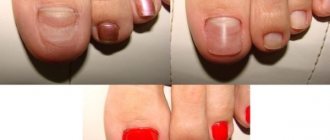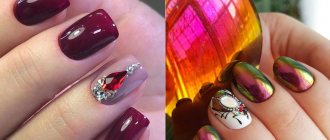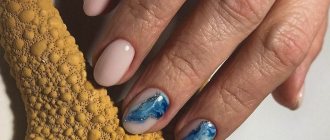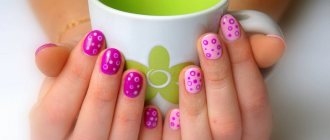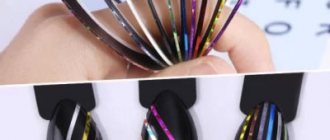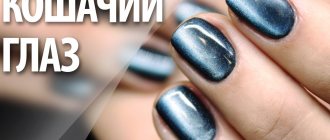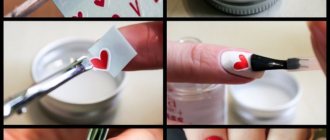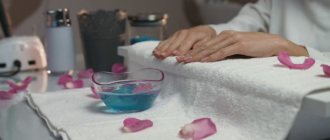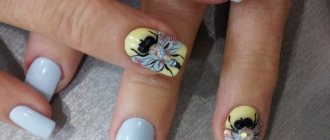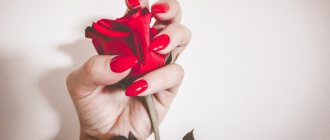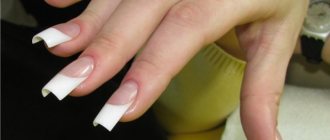Nail biting is a bad habit that occurs in people of all age groups. Due to this, many young people suffer from this bad habit.
Over time, it becomes a practice, and the person biting his nails is not aware of it. Causes may include frustration, stress, loneliness, anxiety and boredom. There could be other reasons as well.
The habit of biting your nails leads to damage to them, as well as damage to the cuticle. Let's look at the problem itself, what it is and how to stop biting your nails.
What is nail biting: a habit or a disease?
Nail biting (also onychophagia): severe biting of fingernails and/or toes. The bad habit begins in childhood, increases during adolescence and decreases with age, although it can continue throughout adulthood.
The increase in cases of onychophagia in adolescents is explained by the difficulty of transitional phases (adolescence) during this period of time, when personality is just being formed and physical changes occur, as well as the feeling of instability that is associated with these phases.
REFERENCE . According to the Diagnostic and Statistical Manual of Mental Disorders, Fifth Edition, nail biting is classified as "obsessive-compulsive and related disorders." The 10th edition of the International Classification of Diseases classifies onychophagia as “Other conditioned behavioral and emotional disorders with onset usually occurring in childhood or adolescence,” such as thumb sucking, nose picking, etc.
Habit of picking your nose
What are the risks:
damage to the nasal mucosa, abscesses, ulcers, and less commonly, the occurrence of infectious diseases.
How to get rid of:
In most cases, people pick their nose to remove dried mucous secretions from their sinuses. In this case, regular rinsing of the nose will help get rid of the bad habit - it clears the sinuses of mucus. If a person picks his nose due to stress and lack of self-confidence (psychological reasons), he needs to consult a psychologist. A common tip here is to keep your hands busy, just like with a nail-biting habit.
What medications will help:
nasal rinsing products Aqua Maris, Aqualor, cotton swabs.
Why do people bite their nails
Nail biting is an underrated habit, and its exact cause is controversial. Causes of onychophagia include psychological, acquired, or familial factors, although it is unknown whether family factors are associated with the problem, such as nail-biting habits in other family members or a genetic predisposition.
Onychophagia can sometimes affect people who are psychologically stable, but it is usually a sign of loss of control over difficult tasks. The main psychological factors that are associated with this behavior are stress, nervousness, anxiety and depressed or bad mood.
In fact, nail biting has been identified as a coping mechanism for stressful conditions, and patients whose habit has been described as an addiction may experience more stress when trying to abstain from onigophagy.
On the other hand, lack of stimulation (low activity, boredom) can also be a trigger for nail biting. Hunger and low self-esteem are known to be possible causes of this bad habit.
Onychophagia is considered an automatic, unintentional behavior. In adulthood, researchers suspect alternatives to nail biting include smoking or chewing gum . One theory is that onychophagy is an extension of the thumb sucking habit. Conclusion: biting your nails is a bad habit.
Causes of a bad habit
- Nail biting usually begins in childhood, and some continue into adulthood. This is how a person copes with stressful situations . Quarrels, conflicts, worries - this is the starting point. Over time, this action occurs automatically.
- Others associate the thought process with this habit, thinking that it will help them find the answer they are looking for faster.
- Constantly thinking about a bad habit, a person involuntarily performs this action more often.
- Lack of self-confidence is a common cause of this habit.
- The problem may be that your nails are too thin .
- A “former” habit can remind itself if a person goes on a diet or quits smoking .
Why do children and teenagers bite their nails?
A child bites his nails for some reason: curiosity, boredom, stress relief, habit or imitation. That's why they bite their nails. Onychophagia is one of the most common of the group of “nervous habits”. These include things like thumb sucking, nose picking, hair twisting or pulling, and teeth grinding.
IMPORTANT . Growing up can make children and teens anxious, and many of these stresses and pressures are invisible to parents. If a child bites moderately (without hurting himself) and unconsciously (while watching TV, for example), or if he tends to bite in response to specific situations (such as performances or tests), this is just his way of coping with minor stress . In these cases, there is no need to worry.
Most likely, the child will stop without assistance. If onychophagia continues longer than desired, or if it is an uncontrollable habit, there are simple ways to stop your child from biting his nails, which we will look at shortly. In the meantime, a few photos - what happens when you bite your nails.
Getting rid of a bad habit
So, after identifying the cause, it is necessary to eliminate it. Here's what you can do:
Observe your child in what situations he begins to bite his nails. Perhaps this is his way of dealing with anxiety before taking a test or speaking in public.
Explain to the child why this should not be done. It is best to do this in a calm, trusting environment.
Should children visit a bathhouse: benefits, harms, simple rules and at what age and at what temperatures can a bathhouse or sauna be visited (70 photos)How to wean a child off your hands correctly and painlessly: ways to break the habit and video recommendations for parents (110 photos)
Instructions on how to quickly and correctly wean a child from a bottle: detailed instructions for parents on how to wean children from eating from a bottle (145 photos and videos)
Eliminate the cause: get someone interested in something, distract them, direct energy in the right direction, prevent them from feeling lonely, help them become self-confident, etc.
Show negative examples so that the child associates onychogaphy with something bad, for example, with a negative character from a fairy tale.
Under no circumstances should children be punished if they bite their nails. Not only will this not help, but it can also cause serious psychological problems in the future.
Parents should simply try not to focus attention on this, surrounding the child with affection and care.
Is biting your nails bad? Causes and risks
Although nail biting is not life-threatening, the habit has many negative consequences.
There are tons of germs that are under our nails that are not embedded in our skin. When you bite your nails and break your skin, you give germs access to your body. Eventually you get an infection. Oh!
ATTENTION . In some cases, infections that occur due to nail biting are so bad and painful that they need to be treated with surgery. A bad habit can even lead to warts caused by human papillomavirus (HPV).
Onychophagia can cause bacterial infections, colds (or worse), toxic poisoning (particularly dangerous are the chemicals in gel polishes, which are very popular today), painful hangnails, fungal growths and damaged teeth (teeth can even move out of their correct position, becoming deformed, wear out prematurely, or weaken over time).
Unsightly and ingrown nails are logical consequences of onygophagy.
Recommended reading:
- What types of warts are there on the hands?
- Causes of warts.
- 5 ways to remove a wart on your finger.
Those who have this bad habit unconsciously broadcast their problems to others. Regardless of whether the stereotype is true, most people bite their nails to seek comfort or relief from a negative emotional state such as suffering, shame, anxiety or boredom.
In a sense, the bad habit makes it so that the person attacks himself, since onychophagia is associated with stress, anxiety, bad mood, etc., then when someone bites their nails in public, they expose feelings of shame and self-loathing.
The point is to stay away from the bad habit, and we will talk more about the reasons to stop onychophagia.
Causes stomach pain
When you bite your nails and even swallow pieces of skin and nail plate, the microbes hidden under the surface of the nail are transferred to the stomach. Needle worms or pinworms, as well as bacteria, are transferred to the stomach and cause pain.
If your seat on a plane is kicked by children: passengers told their methods
You can’t tell your daughter that she did her homework wrong: parenting rules
It looks scary, what if Covid gets scared? The Japanese took extreme measures
Treatment or how to stop a bad habit
To stop biting your nails, dermatologists recommend the following tips:
- Make sure to keep your nails short (it won't be as tempting to bite).
- Apply bitter tasting nail polish .
- Get regular manicures: spending money on making your fingers look attractive will make you not want to bite them. Alternatively, apply stickers or wear gloves to prevent biting.
- Replace a bad habit with a good one : When someone feels like they are biting their nails, they should try playing with a stress ball or some other device that is used for this purpose. This will help keep your hands busy and away from your mouth.
- Identify triggers: Triggers are “triggers” - mechanisms that start a bad habit. These could be physical triggers such as having hangnails or other triggers such as boredom, stress or anxiety. By figuring out what causes nail biting, you can understand how to avoid these situations and develop a plan to stop. Just knowing when we are prone to biting can help solve the problem.
- Try to gradually stop onychophagia: some doctors recommend gradually getting rid of the bad habit. You might first try to stop biting one set of nails, such as your thumbnail. Once successful, you can do this with your little finger, your index finger, or even your whole hand. The goal is to get to the point where you no longer bite any of your nails.
We recommend that you read : 20 healing ointments for hangnails, cracks, and cuts on the hands.
What you can do and what it is better not to do if such a problem arises in a child
If a child bites his nails, what to do - there are several ways to solve the problem. First, understand why the child bites his nails, and then choose a solution.
IMPORTANT. You can't punish a child. Find out the cause of the concern (if this is why your child constantly bites his nails) and talk to him about the problem and treatment. We need to help the child to understand the habit and that it is bad.
Offer a replacement activity or two, such as giving your child some gum or play dough to play with instead of biting his nails again, or some other alternative of your choice.
Also, try some relaxation techniques when your child feels the urge to bite his nails , such as deep breathing or clenching and releasing his fists.
Make sure your child has plenty of opportunities to run and play —outside if possible—to burn off tension and nervous energy.
Some children find arts and crafts projects an effective way to keep their hands busy and relax at the same time.
Other children may benefit from learning to play a musical instrument. The main thing is to try, try and try again.
Home and folk methods - how to stop biting your nails
BITTER PUMPKIN. It is well known for its bitter taste and nutritional value. Take one bitter gourd and make a good paste. Then use either the paste or the juice. Apply on your nails and leave for a while. This process will definitely help. The bitter taste will keep your fingers away from your mouth.
CUT YOUR NAILS. Nails are the main cause of onychophagia. Trim your nails regularly to keep them short.
GARLIC. Garlic can be found in every kitchen as it is used in different types of dishes. The strong aroma of garlic and its pungent taste will help get rid of the bad habit of biting your nails.
Garlic is antiseptic in nature, so it will help you avoid infections and also strengthen your nails. Take garlic cloves and rub them on your nails. Then let it dry. The pungent taste of garlic will help you avoid harmful practices.
VARNISH COATING. Use bitter nail polish (easy to find and buy) - an excellent remedy for nail biting. The varnish can be cooked on different types of vegetables to make it taste bitter. Just use this polish and keep it dry.
The bitter taste of nails will help you avoid a bad habit.
AZADIRACHTA INDICA OIL . Azadirachta indica oil is very bitter in taste and contains antiseptic properties. This particular oil is used to avoid nail biting habit. When using it, all kinds of infections are also avoided. Take a small amount of oil and apply it on your nails using a cotton ball. Then leave for a while to let the oil dry.
GLOVES. Wearing gloves can help relieve nail biting problems. Most people unknowingly commit harmful actions, and therefore using gloves will help get rid of onychophagia. Take gloves and wear them regularly. Wear for several months until the bad habit disappears.
ARTIFICIAL (EXTENSIONS) NAILS. By using artificial nails (for girls, of course, like stickers), you can avoid the usual harmful practice.
Artificial nails will properly cover the original nails, protecting them from the bad habit.
PATCH. A patch is applied to cover them and keep them away from harmful activities. Take a few patches and place them on your nails. It can be one of the best motivators to get rid of a problem. Apply a fresh patch or bandages when the previous ones are worn out or torn for various reasons.
RUBBER. Use the rubber band (thin rubber band) trick. Take one rubber band and put it on your wrist. Every time you bite your nails, secure your wrist with a rubber band. The rubber band will hurt suddenly and train the brain so that you don't perform the habit again. This is the best psychological preparation of the mind to avoid onychophagia.
Stories of those who managed to get rid of the habit of biting their nails
PECULIARITIES. We are all different, one way will help some, another will help others. This also applies to onygophagy. These 3 real stories of those who managed to get rid of the habit of biting their nails are further proof of this.
“I also bit my nails for many years, now I have beautiful, well-groomed hands, I overcame myself, But: I developed the habit of biting the inside of my cheeks and biting my lips. that is, habits replace themselves, apparently you need to look for inner peace, then the habits themselves will disappear” Olga Bartenyeva, housewife.
“I’ve been gnawing since childhood, for many years... and I didn’t just gnab, but simply ate... this is such a habit... I forced myself to grow it several times, but I could hold out for a month at most... I developed the habit of clenching my hands into fists and hiding my fingers ..and nothing helped either..then I once saw a girl on the subway with the same hands and was horrified..in the end I forced myself not to put my fingers to my mouth and started taking care of my nails (it’s nice when my hands are well-groomed) , paint with bright varnish, gradually regained my shape and forced myself not to hide my fingers... and I finally stopped this habit) so the main thing is to get crazy for the first few months, just honestly get crazy) and then you won’t even want to…” Svetlana Grishchenko, office manager.
“I am 16 years old, and the habit of biting my nails began at the age of 6, when my parents divorced (stress), I bit my nails for 5 years!!! I want to say bitter varnish is nonsense... I judge by myself... when I got older (9-10 years old) I was ashamed, but I couldn’t do anything. I stopped biting at the age of 12. Once I saw a woman’s nails and asked my mother, “What’s wrong with them?” Mom replied, “The woman also bit her nails and this is the result!” and I thought! In general, until the child himself understands that biting his nails is terribly ugly, it is useless to wean him!!! I stopped biting my nails in time, because the shape of my nails is constantly deformed, now I have very good and beautiful nails, and I no longer have this habit!” Tatyana Oborina, student.
How to stop biting your nails
To forget about the problem and stop biting your nails, follow these simple tips:
- avoid stress or change your attitude towards problems;
- make sure that your fingers are well-groomed and beautiful, so that it would be a pity to spoil them;
- you need to stop every attempt at onychophobia on your own;
- Carry scissors and a nail file with you. If a hangnail appears or a nail breaks, it will be easy to fix without gnawing;
As a last resort, use bitter varnish, garlic or another method described in our article . The main thing is not to give up, try, try and try again and remember that it will take some time. Good luck!
If you find an error or traces of code (for example, individual characters >, ],=...), please select a piece of text and press Ctrl+Enter.
How to stop biting your nails?
It is difficult to cope with a habit that has accompanied you for many years, but the main thing is to sincerely want it. There are many ways. It is important to understand that the healing process will take time, so you need to be patient.
You can, for example, get an exquisite manicure, because it would be a pity to ruin it, apply bitter varnish, make a bet with someone, or make an appointment with a psychologist. Read more about ways to combat this bad habit further in our article.
Do you often bite your nails? You are not alone! According to statistics, 33% of adults continue to do this until old age.
Have you ever wondered why you do this? Most people consider this a reaction to stress or a difficult situation.
This is true, but not the whole truth! As a new study by American psychologists shows, the habit of biting the tips of your nails may mean that you are a perfectionist.
Popular: Ksenia Sobchak showed her family. Mesmerizing with admiration!
Modern psychology describes perfectionism as follows: “Endless analysis of one’s own achievements and views. A direct path to feeling unhappy. Often accompanied by depression."
Here's what else the study says about nail biters.
You bite your nails - what does that mean?
This phenomenon is called “repetitive body-oriented behavior.” Psychologists refer to it as “repetitive, damaging, dysfunctional habits such as hair pulling, skin picking, or nail biting.”
Researchers contrast two models in which these habits occur: emotional regulation and disorder. In the first case, you attack your nails to soften the effect of negative feelings. In the second, you chew when you are worried, tired, disappointed, upset.
It is the second model that is more common, scientists say. She “demonstrates a maladaptive planning style with high demands on herself and an unwillingness to relax.”
What did the study show?
The researchers observed two groups of people - with and without repetitive bad habits - and confirmed their theory. The first group is really:
she indulged in her habits more often than the second; fell into apathy, disappointment and stress more quickly; demonstrated "a more maladaptive planning strategy associated with problems in regulating one's own emotions."
3. Bad habits and perfectionism.
Study author Dr Kieron O'Connor said:
“People with repetitive habits may be perfectionists in the sense that they cannot relax and carry out their responsibilities calmly. Therefore, they are prone to frustration, impatience and disappointment when they do not succeed.”
Simply put, we bite our nails not out of stress or fatigue, but out of frustration and frustration. Therefore, the study confirmed the close connection between bad habits and perfectionism.
4. Chipped nails and health.
Nail-biting isn't the most harmful habit, but it does have its "physical and emotional consequences," scientists say.
The physical consequences are:
Painful and reddened nails and skin on the fingers Bleeding wounds and the chance of infection Threat of introducing bacteria and diseases into the mouth through dirty fingers Weakened tooth enamel Loose teeth Poor impression on others
Psychologists associate bad habits with disorders and even diseases, such as obsessive-compulsive syndrome. They are very common, annoying and unproductive.
Since scientists have proven the link between biting nails and perfectionism, this may serve as an excuse and even a source of pride for some.
But scientists insist: perfectionism itself is also associated with mental disorders. These include addiction to alcohol or drugs, personality and eating disorders, self-harm, preoccupation with appearance, social anxiety, clinical depression and heart problems.
Therefore, there is no need to justify your bad habits - even with your own perfectionism and hyper-responsibility.
Olya
Living deliciously is a whole science!
